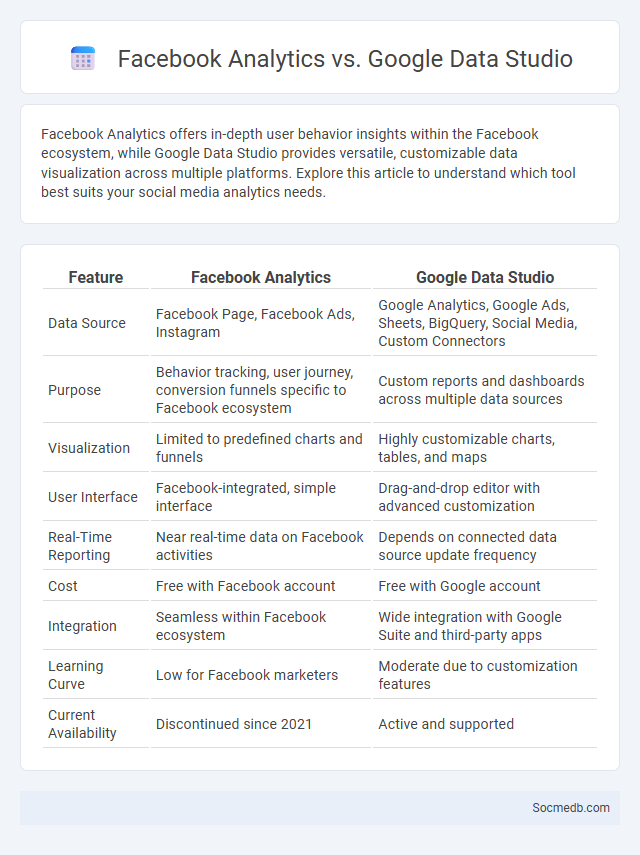
Photo illustration: Facebook Analytics vs Google Data Studio
Facebook Analytics offers in-depth user behavior insights within the Facebook ecosystem, while Google Data Studio provides versatile, customizable data visualization across multiple platforms. Explore this article to understand which tool best suits your social media analytics needs.
Table of Comparison
| Feature | Facebook Analytics | Google Data Studio |
|---|---|---|
| Data Source | Facebook Page, Facebook Ads, Instagram | Google Analytics, Google Ads, Sheets, BigQuery, Social Media, Custom Connectors |
| Purpose | Behavior tracking, user journey, conversion funnels specific to Facebook ecosystem | Custom reports and dashboards across multiple data sources |
| Visualization | Limited to predefined charts and funnels | Highly customizable charts, tables, and maps |
| User Interface | Facebook-integrated, simple interface | Drag-and-drop editor with advanced customization |
| Real-Time Reporting | Near real-time data on Facebook activities | Depends on connected data source update frequency |
| Cost | Free with Facebook account | Free with Google account |
| Integration | Seamless within Facebook ecosystem | Wide integration with Google Suite and third-party apps |
| Learning Curve | Low for Facebook marketers | Moderate due to customization features |
| Current Availability | Discontinued since 2021 | Active and supported |
Introduction: Comparing Facebook Analytics, Google Data Studio, and Google Analytics
Facebook Analytics, Google Data Studio, and Google Analytics each offer unique insights into social media performance, focusing on user behavior, data visualization, and website traffic respectively. Your choice depends on the specific metrics you want to analyze, such as audience engagement on Facebook with Facebook Analytics, customizable reports with Google Data Studio, or comprehensive web analytics via Google Analytics. Understanding these tools enhances your ability to optimize social media strategies and measure campaign effectiveness.
Key Features Overview
Social media platforms offer interactive features such as real-time messaging, content sharing, and personalized feed algorithms designed to enhance user engagement. Advanced analytics tools provide insights into audience behavior, helping you tailor content strategies for maximum impact. Integration with multimedia formats, including videos, live streams, and stories, supports dynamic communication and brand visibility.
Data Sources and Integration Capabilities
Social media platforms generate vast amounts of data from diverse sources such as user profiles, posts, comments, and interactions that can be integrated through APIs and webhooks for comprehensive analysis. Your ability to unify these data sources enhances insights into customer behavior, sentiment analysis, and trend forecasting. Robust integration capabilities allow seamless data aggregation from platforms like Facebook, Twitter, and Instagram, enabling real-time monitoring and targeted marketing strategies.
User Interface and Reporting Tools
Social media platforms enhance user engagement through intuitive user interfaces that simplify navigation and content interaction. Advanced reporting tools provide detailed analytics on audience behavior, post performance, and engagement metrics, allowing you to make data-driven decisions. These combined features optimize the social media experience and improve strategic planning.
Visualization and Customization Options
Social media platforms offer extensive visualization tools such as customizable image filters, video editing features, and interactive story templates, enhancing user engagement. Customization options include tailored profile layouts, personalized content feeds driven by AI algorithms, and adjustable privacy settings to meet individual preferences. These features collectively improve user experience and drive platform retention through dynamic content presentation and user control.
Tracking and Measurement Capabilities
Social media platforms offer advanced tracking and measurement capabilities that enable you to analyze audience engagement, conversion rates, and campaign performance in real time. Tools like Facebook Pixel, Instagram Insights, and Twitter Analytics provide detailed data on user behavior, demographic trends, and content reach. Leveraging these insights allows your marketing strategy to be more targeted, data-driven, and results-oriented.
Collaboration and Sharing Features
Social media platforms offer powerful collaboration and sharing features that enable you to connect seamlessly with colleagues, friends, and communities worldwide. Real-time collaboration tools like shared documents, group chats, and video conferencing enhance productivity and foster creativity across diverse teams. These features make sharing content, ideas, and feedback intuitive, driving engagement and strengthening your digital presence.
Pricing and Accessibility
Social media platforms offer a wide range of pricing models, including free access supported by advertising, subscription-based tiers, and premium features for businesses and influencers. Accessibility is enhanced through mobile apps, multilingual interfaces, and compliance with accessibility standards such as WCAG, enabling users with disabilities to engage effectively. Competitive pricing combined with widespread device compatibility drives the global adoption of social media services.
Ideal Use Cases and Industry Applications
Social media platforms excel in brand awareness, customer engagement, and targeted advertising, making them ideal for industries like retail, entertainment, and hospitality. Your business can leverage social media analytics to understand customer preferences and deliver personalized marketing campaigns that boost conversions. Influencer partnerships and real-time customer support further enhance brand loyalty and market reach across various sectors.
Conclusion: Selecting the Right Analytics Tool
Choosing the right social media analytics tool depends on the platform's data accuracy, user interface, and integration capabilities with existing marketing software. Tools like Sprout Social, Hootsuite, and Google Analytics offer robust features tailored to different business needs and budgets. Maximizing ROI requires selecting an analytics solution that provides actionable insights, real-time monitoring, and customizable reports aligned with specific campaign goals.
 socmedb.com
socmedb.com